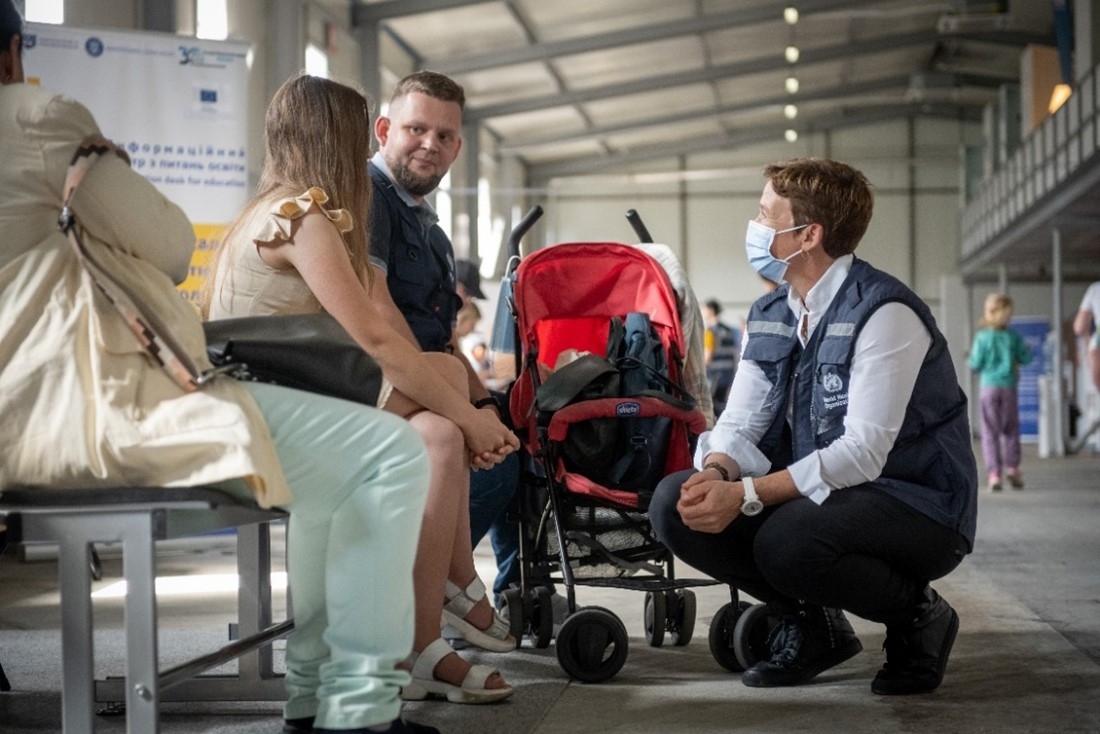In 2022, conflict in Ukraine led to a large influx of refugees seeking safety in the European Union (EU). By January 2023, over 2.36 million Ukrainians had sought refuge in Romania, with more than 100 000 receiving EU temporary protection. The Romanian people and government responded with solidarity, providing refugees with the same access to health care as citizens with health insurance. Despite this, communication and language barriers, unfamiliarity with the healthcare system, and a lack of knowledge and information created obstacles for refugees when accessing healthcare services [1]. In response, the World Health Organization (WHO) established two new health clinics, supported seven General Practitioner (GP) clinics, hired cultural mediators, and collaborated with Civil Society Organizations (CSOs) to provide Primary Health Care (PHC) services to refugees. WHO also disseminated information about healthcare access, vaccinations, medication availability, and proper antibiotic use. Since June 2022, the WHO clinics and WHO-supported GP clinics have respectively served 1600 and 600 refugee patients nationwide.
Key WHO Contributions
Establishing two new health clinics for refugees
Providing financial, technical, and operational support to improve healthcare access to refugees through seven General Practitioner (GP) clinics, cultural mediators, and Civil Society Organizations (CSOs)
Financing the provision of reliable health and healthcare service information to refugees through leaflets and a call centre.
How did Romania, with the support of the WHO Secretariat, achieve this?
To expand access to health services early in the emergency, WHO Romania funded the refurbishment and repurposing of two temporary spaces in counties with large refugee populations - a United Nations Refugee Agency (UNHCR) centre in Bucharest and a United Nations Children’s Fund (UNICEF)-UNHCR Blue Dots Hub [2] in Galați. These spaces were rapidly transformed into specialized refugee clinics, providing essential free-of-charge Primary Health Care services, such as Sexual and Reproductive Health services and Mental Health and Psychosocial Support (MHPSS). WHO Romania also provided financial and technical support to seven GPs to enable them to become refugee-inclusive practices. To gain a better understanding of the needs of GPs, WHO Romania conducted a survey in partnership with the Romanian National Society of Family Medicine [3] and held in-depth interviews. WHO Romania then procured and delivered medical equipment, office furniture, translation devices, and medical supplies to the GPs according to their individual needs. To strengthen access to specialized health services in Bucharest, which has a particularly large refugee population, WHO collaborated with CSOs: CSO Estuar [4] provided four psychologists to boost MHPSS while international CSO Actions Santé Femmes and the local Independent Midwives Association provided additional obstetrics and midwifery services.

WHO Romania’s representative, Dr Caroline Clarinval, visits the Romexpo refugee clinic in Bucharest.
Photo credit: Mihai von Eremia, WHO Romania.
‘We thank the Romanian people, the Government, the healthcare staff and the volunteers and for their incredible solidarity and continued support in the past year for the people fleeing the war in Ukraine. Many of the refugees in Romania are highly vulnerable elderly people, women, and children. Everyone has the right to health. We are committed to supporting the Ministry of Health to improve the access for refugees to medical care’
- Dr Caroline Clarinval, WHO Representative and head of Country Office in Romania.
To facilitate communication between healthcare providers and refugees and provide further MHPSS services, WHO Romania contracted seven cultural mediators through United Nations Volunteers (UNV). Cultural mediators were deployed to work in WHO Romania and GP clinics and the wider community in five cities with a high concentration of refugees: Bucharest, Galați, Cluj, Târgu Mureș, and Brașov.
To increase refugees' knowledge of healthcare access, vaccination, medication availability, and proper antibiotic use, WHO Romania engaged a consultant from its Global Outbreak Alert and Response Network (GOARN). Leaflets were developed in Ukrainian, Russian, and English, with input from Romania's Ministry of Health (MOH), National Institute for Public Health (NIPH), and National Health Insurance House (NHIH), along with other partners, and made accessible online. This access to reliable information enabled refugees to feel more settled and assured in accessing health services. One mother remarked, “At first it was a disaster. The children got sick and I didn’t know where to go. But now it’s easier and I know what to do”. WHO Romania responded to refugee’s requests for a call centre and provided financial assistance to hire a call centre coordinator, for the development of Standard Operating Procedures (SOPs), and for the development of the call center script, including predefined answers for common questions. The call centre was established in January 2023 in partnership with United Nations (UN) agencies and the MOH.
“When we have people with health problems, we call a local family doctor who offered to help us. For example, a 73-year-old woman arrived here and, after measuring her blood pressure, I noticed it was very high, so I immediately called the family doctor. He prescribed medication, and I went to the pharmacy to buy it, using local authority funds. We’ve also received donations of medicines from local pharmacies”
- Maria - community health nurse at a refugee centre in Dărăbani near the border with Ukraine.
WHO Romania has been assisting the country in its efforts to meet the health needs of refugees through an evidence-based approach. Data from multiple sources have been used to tailor service provision, including primary qualitative research with refugees and surveys conducted by other stakeholders. The Romanian government, in collaboration with its health partners, has set out a clear vision for 2023: to create an inclusive healthcare and social protection system that provides universal, sustained access to services, responds quickly and effectively to emergencies, and ensures healthy lives for all. WHO Romania is committed to providing support to Romania in order to achieve this goal.
References

